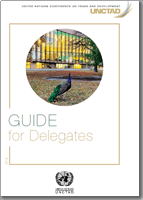
The United Nations Conference on Trade and Development (UNCTAD), which was established by the General Assembly in 1964, is the United Nations body responsible for dealing with development issues as they relate to international trade – a main driver of sustainable development.
The goals of UNCTAD are to maximize the trade, investment and development opportunities of developing countries, and to assist them in their efforts to integrate into the world economy on an equitable basis.
The UNCTAD Secretary-General is appointed by the United Nations Secretary- General in consultation with regional groups and with formal endorsement by the General Assembly. The position rotates between the groups representing Africa, Asia and Latin America.
UNCTAD currently has 195 member States. Consensus is at the centre of the way UNCTAD operates. Its budget is determined by the General Assembly, and its subsidiary Advisory Committee on Administrative and Budgetary Questions, and the Fifth Committee, which also has responsibility for administrative and budgetary matters.
UNCTAD’s mode of operation can be summed up in three words which illustrate its key functions delivered through three synergetic pillars of work:
-
REFLECTION in the form of research, policy analysis and data collection on development issues is at the core of its work. Its ahead-of-the curve analyses form the basis for recommendations to economic policymakers.
-
DIALOGUE through the intergovernmental machinery. UNCTAD is a forum where representatives of all countries can freely debate and discuss how to establish a better balance in the global economy.
-
ACTION based on its research and on the consensus decisions taken by member States, UNCTAD carries out direct technical assistance to help developing countries.


